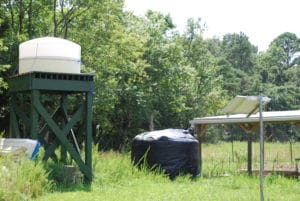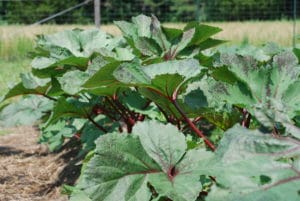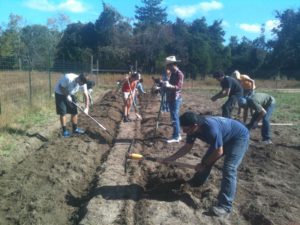New Campus Farm – Fruits of Labor
An Open Letter to Aspiring School Farmers:
This season, for the first time, the farm at the Richard Stockton College of New Jersey is in production. Cat (short for Caitlin) finds herself the newly anointed manager of this student-run farm. Her advice: if you want to start a farm at your school, do it! The challenges may seem paramount but with creative solutions the fruit of labor is worth it. Aspiring school farmers are encouraged to keep these things in mind.
Beginning Farmer Resources
- Northeast Beginning Farmers Project. Watch production videos and interviews with farmers, work through planning tutorials, find local people to help, and much more.
- Local Help. It’s always best to first ask questions to your local small farm agent since they are familiar with local zoning issues and regulations for your county. You can find your local Small Farms Cooperative Extension Agent by checking the county-by-county listing.
- Financing/Grants/Loans. Everyone is looking for funding to help build and grow their small farm. We’ve created a section on the Small Farms Program website to feature a library of funding opportunities.
- Learn from the example of another student-run farm: Dilmun Hill at Cornell University!
1. Be Aware of Your Surroundings
Our farm, as well as our entire college, is located within the Pinelands National Reserve. The Reserve, born in 1978, enacted a regional plan blending participation from federal, state, and local jurisdictions to guide development and protect natural resources. Therefore, the farm has an extra set of rules from the Pinelands Commission, the regional managing body. If they say the farm cannot compost in contact with the ground and must contain all leachate, the rules must be followed – a 17 trillion gallon aquifer is at stake. This particular guideline put student problem-solving skills to the test. One option was to convert 55-gallon drums into tumblers or otherwise use a discarded hot tub, but someone would have to climb in and regularly turn the compost. The decision fell to a third option – a few large bins that lay dormant from an old student project. They were perfect because they were already on campus and were free, important themes for all campus farms.

Solar rainwater/irrigation catchment system. Photo by Cat Clarke
2. Choose the Path of Least Resistance
There is no water at the farm. There is no well nor an electric hookup. The farm site is on distant portion of Stockton’s 2,000 acre campus, far from the main buildings. So, a creative solution was needed. We designed a drip irrigation system, which is entirely gravity-fed and supplied by rainwater. Students constructed the pole barn (the roof of which collects water), built the water tower, and installed the plumbing. A solar panel was added, necessary to power the pump that pushes the water to the top of the tower. Drip irrigation is not conventionally used in this part of the world, due to generally abundant surface and groundwater, but it is enough for now. The challenges seemed insurmountable, but things are working!
3. Accept What You Can’t Change
Working within a state college, or really any institute of higher learning, tends to slow things down. Permissions and purchases are going to get tied up in paperwork, need three different signatures, and often require a reimbursement. A small example: the farm’s first spring seed order never came in. The order was held up in the purchasing department, where they were unaware of the time sensitivity of receiving the seeds in time to plant, and the new student farmers were unaware of how long it would take to add a new vendor to the computer system.

First crops: burgundy okra. Photo by Cat Clarke
4. Use Your Expertise (learned and local)
It’s okay if you don’t know how to farm, you can learn. There are innumerable resources available to you – books, extension agencies, gardening volunteer groups, local farmers, professors, websites and more. However, stay focused; you can immerse yourself in writings and advice forums, but you still have to get dirty! Just keep learning and having fun. Cat & helpers relied on professors, other farmers in the area, extension agents, and their own Internet research. The list of resources will certainly grow along with the farm.
5. They Come and They Inevitably Go
Where did all of the students who started the farm go? The proposal took many months, meetings, follow ups, and a measure of resolve to work with the system, just to get approval for this project. Those students who did get the farm running are now working on other projects or have graduated, while the next wave of student farmers have taken on the daily business of pulling weeds and crushing bugs on our organic farm.
Furthermore, you may encounter many willing volunteers at first—students may quickly lose interest once they realize that farming happens in the heat of summer. It can be sweaty, dirty, uncomfortable and repetitive work – luckily the beach is just down the road. Nevertheless, on a college campus you are bound to find people who are willing to work hard for the satisfaction of knowing exactly where their food is coming from and making it available to a community of peers.
Making sustainable local produce available to your community will have many benefits. It will begin a conversation about food – its origins, its quality, and its environmental costs. This discussion is contagious and soon others will want to participate. By starting a farm one is capable of raising awareness, motivating people, and changing practices. From farms to individuals, from colleges to communities, we can discover and create a better way to eat.
Caitlin (Cat) Clarke is the Farm Manager at Richard Stockton College of New Jersey and a senior Environmental Science Major – she can be contacted at clarkec6@go.stockton.edu.



What a great job our Cait is doing, A real credit to Stockton
How resourceful !!!!!!
This makes me so happy to read. Cat you have so much to be proud of and it makes me feel good knowing other people my age are interested in where our food comes from, how it is grown, whether it is organic, etc. Keep up the good work, the world needs more people like you!!!